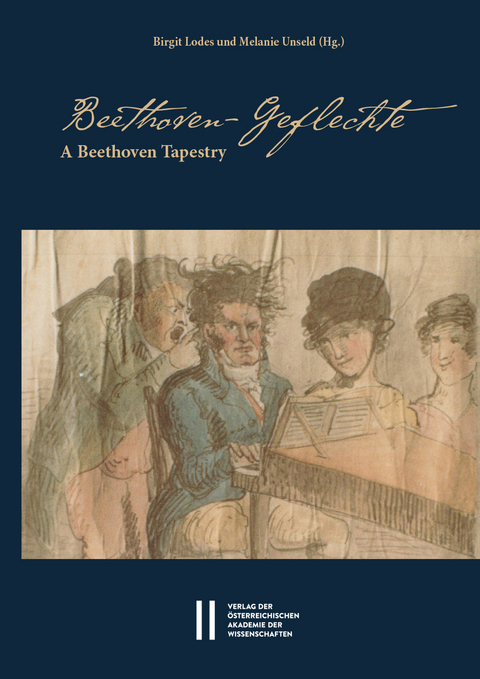
Beethoven-Geflechte — A Beethoven Tapestry
Networks and Cultures of Memory
Seiten
2024
Verlag der österreichischen Akademie der Wissenschaften
978-3-7001-9186-5 (ISBN)
Verlag der österreichischen Akademie der Wissenschaften
978-3-7001-9186-5 (ISBN)
Beethoven, der Einzelgänger: Dieses historiographische Bild beherrscht seit Langem Beethoven-Biographik wie Beethoven-Forschung. So gut dieses Bild in das Narrativ eines Künstlergenies passt, so unscharf wird es, betrachtet man Beethovens Lebenswelten in den ersten Dekaden seiner Wiener Zeit genauer. Hier war Beethoven als Pianist und Komponist, als Lehrer und humorvoller Gesprächspartner Teil eines großflächigen Geflechts aus gesellschaftlichen, künstlerischen, professionellen, verwandtschaftlichen und freundschaftlichen Beziehungen. Auf welche gesellschaftlichen Zirkel Beethoven traf als er sich in der kulturellen und politischen Metropole niederließ, wie sich Beethoven in diesen Zirkeln bewegte und musikalisch kommunizierte, stellt der vorliegende Sammelband neu zur Diskussion.
In den politischen Turbulenzen des frühen 19. Jahrhunderts wurde die Autorität der Aristokratie immer weiter zurückgedrängt, was die sozialen und kulturellen Verhältnisse auf vielfältige Weise veränderte und die Erinnerungskultur, an wen und wie man sich erinnern sollte, neu bestimmte. Ein Komponist wie Beethoven konnte auf diese Weise, auch durch Selbstrepräsentation als anti-feudaler, bürgerlicher Künstler oder als exzentrisches Genie, in eine heroische Geschichtserzählung eingefügt werden, die den politischen Zeitläuften entgegenkam. Der Anlass des vorliegenden Bandes, das Beethoven-Jubiläumsjahr 2020, bietet daher auch die Gelegenheit, die weitere Folge dieser Erinnerungskultur und die damit verbundenen Veränderungen des Beethoven-Bildes bis in das 20. Jahrhundert zu verfolgen. Beethoven, the loner – that is the historiographical image that has long dominated biographies and research on Beethoven. But while this image resonates with the enduring impression of the artistic genius, its credibility founders when one examines more closely his life and environment during his first decades in Vienna. Here, as a pianist and composer, as a teacher and witty conversationalist, Beethoven belonged to an expansive and close-knit tapestry of social, artistic, professional, family and friend-based relationships. And it is the social circles Beethoven encountered as he settled in the cultural and political metropolis, as well as how he negotiated his way through and communicated musically within them, that are newly put up for discussion in this edited volume.
The political turbulence of the early 19th century saw the aristocracy’s authority increasingly displaced, transforming the social and cultural conditions in countless ways and newly determining who should be remembered and how. This meant that a composer like Beethoven – aided by his self-mythologization as an anti-feudal, bourgeois artist and eccentric genius – could easily be incorporated into the heroic historical narrative that characterized the contemporary political tide. The occasion celebrated in the present volume – the Beethoven anniversary year of 2020 – therefore also offers the opportunity to trace and rethink the after-effects of this culture of remembrance, including how Beethoven’s image continued to evolve throughout the 20th century. https://onix.oeaw.ac.at/Cover/9783700191865.jpg ?
In den politischen Turbulenzen des frühen 19. Jahrhunderts wurde die Autorität der Aristokratie immer weiter zurückgedrängt, was die sozialen und kulturellen Verhältnisse auf vielfältige Weise veränderte und die Erinnerungskultur, an wen und wie man sich erinnern sollte, neu bestimmte. Ein Komponist wie Beethoven konnte auf diese Weise, auch durch Selbstrepräsentation als anti-feudaler, bürgerlicher Künstler oder als exzentrisches Genie, in eine heroische Geschichtserzählung eingefügt werden, die den politischen Zeitläuften entgegenkam. Der Anlass des vorliegenden Bandes, das Beethoven-Jubiläumsjahr 2020, bietet daher auch die Gelegenheit, die weitere Folge dieser Erinnerungskultur und die damit verbundenen Veränderungen des Beethoven-Bildes bis in das 20. Jahrhundert zu verfolgen. Beethoven, the loner – that is the historiographical image that has long dominated biographies and research on Beethoven. But while this image resonates with the enduring impression of the artistic genius, its credibility founders when one examines more closely his life and environment during his first decades in Vienna. Here, as a pianist and composer, as a teacher and witty conversationalist, Beethoven belonged to an expansive and close-knit tapestry of social, artistic, professional, family and friend-based relationships. And it is the social circles Beethoven encountered as he settled in the cultural and political metropolis, as well as how he negotiated his way through and communicated musically within them, that are newly put up for discussion in this edited volume.
The political turbulence of the early 19th century saw the aristocracy’s authority increasingly displaced, transforming the social and cultural conditions in countless ways and newly determining who should be remembered and how. This meant that a composer like Beethoven – aided by his self-mythologization as an anti-feudal, bourgeois artist and eccentric genius – could easily be incorporated into the heroic historical narrative that characterized the contemporary political tide. The occasion celebrated in the present volume – the Beethoven anniversary year of 2020 – therefore also offers the opportunity to trace and rethink the after-effects of this culture of remembrance, including how Beethoven’s image continued to evolve throughout the 20th century. https://onix.oeaw.ac.at/Cover/9783700191865.jpg ?
is Professor for Historical Musicology at the University of Vienna
is Professor for Historical Musicology at the University for Music and Performing Arts Vienna (mdw)
| Erscheinungsdatum | 22.08.2024 |
|---|---|
| Reihe/Serie | Veröffentlichungen der Kommission für Musikforschung ; 30 |
| Verlagsort | Wien |
| Sprache | englisch; deutsch |
| Maße | 155 x 225 mm |
| Themenwelt | Kunst / Musik / Theater ► Musik ► Musikgeschichte |
| Sachbuch/Ratgeber ► Sport ► Tanzen / Tanzsport | |
| Geisteswissenschaften ► Geschichte | |
| Schlagworte | Birgit Lodes • Erinnerungskultur • Geschichte • Geselligkeiten • Historiographie • Kulturforschung • Ludwig van Beethoven • Melanie Unseld • Musikwissenschaft • narrative • post-napoleonische Ära • Salon • Tanz • Tanzwissenschaft • Veröffentlichungen zur Musikforschung • Wiener Adel • Zweite Gesellschaft |
| ISBN-10 | 3-7001-9186-3 / 3700191863 |
| ISBN-13 | 978-3-7001-9186-5 / 9783700191865 |
| Zustand | Neuware |
| Haben Sie eine Frage zum Produkt? |
Mehr entdecken
aus dem Bereich
aus dem Bereich
das Gesamtkunstwerk Kraftwerk
Buch | Softcover (2024)
C.W. Leske Verlag
24,00 €
Buch | Softcover (2022)
Edition Olms (Verlag)
29,95 €


